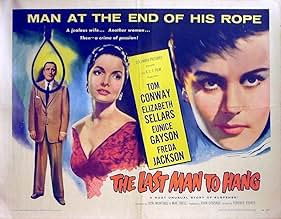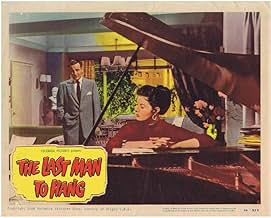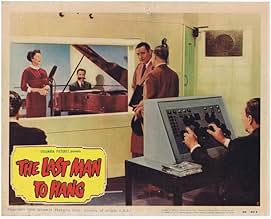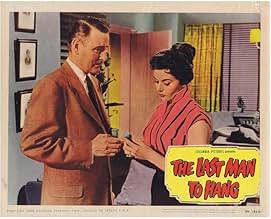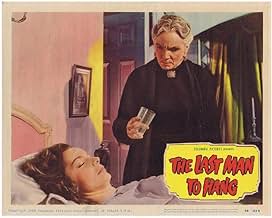IMDb RATING
5.9/10
168
YOUR RATING
Sir Roderick Strood is on trial for the murder of his wife.Sir Roderick Strood is on trial for the murder of his wife.Sir Roderick Strood is on trial for the murder of his wife.
Featured reviews
A very wooden, ageing Tim Conway, looks totally disinterested in his part and also makes little effort to engage the audience about his feelings towards his murdered wife. Since he seems to show little emotion about his own circumstances of being on trial for his life, and the fact that he 'wanders' through the film almost tight lipped, the film becomes lifeless and aimless! The only real interest comes in the courtroom scenes. Give this film a miss. A wasted opportunity of what could have been a dramatic and nail biting film. Instead it induces sleep!
Directed by Terence Fisher, The Last Man to Hang from 1957 stars Tom Conway as a man accused of killing his wife Daphne (Elizabeth Sellars).
As others have pointed out, this was an okay film until the ridiculous twist at the end which made no sense. At all.
Conway plays Sir Roderick Strood, introduced to a soprano (Eunice Grayson) who is singing Lucia on the radio. He falls for her and wants to divorce his wife. At one point, he and Daphne fight and she pulls a gun, evidently to kill herself, which he wrestles away from her. The gun goes off, bringing the maid (Freda Jackson) who hates Strood. No one is hurt.
Strood gives Daphne sleeping tablets, and he is accused of killing her, since the maid had given her a sedative and claims he knew it.
We see the jurors receiving jury duty summons. One of them is Anthony Newley. You think it's going to be a story about the jurors.
This movie is all over the place. The end is terrible.
As others have pointed out, this was an okay film until the ridiculous twist at the end which made no sense. At all.
Conway plays Sir Roderick Strood, introduced to a soprano (Eunice Grayson) who is singing Lucia on the radio. He falls for her and wants to divorce his wife. At one point, he and Daphne fight and she pulls a gun, evidently to kill herself, which he wrestles away from her. The gun goes off, bringing the maid (Freda Jackson) who hates Strood. No one is hurt.
Strood gives Daphne sleeping tablets, and he is accused of killing her, since the maid had given her a sedative and claims he knew it.
We see the jurors receiving jury duty summons. One of them is Anthony Newley. You think it's going to be a story about the jurors.
This movie is all over the place. The end is terrible.
If presented with this along with 'The Intimate Stranger' and 'Hell is a City', the Losey might prove tricky to pick out. Five years later Losey and Guest were still both making black & white thrillers (of which those by Guest probably had the edge) but Fisher was by now firmly established as a director of Technicolor morsels for Hammer; while at the time of this astringent courtroom drama he was the only one never to have worked in colour.
Like most British films of the era it has an extraordinary supporting cast; including fleeting appearances by John Schlesinger as a doctor called Goldfinger and an already worldly-looking young Gillian Lynne as Anthony Newley's girlfriend.
Like most British films of the era it has an extraordinary supporting cast; including fleeting appearances by John Schlesinger as a doctor called Goldfinger and an already worldly-looking young Gillian Lynne as Anthony Newley's girlfriend.
Terence Fisher is famous for directing dozens of popular genre films, notably the Hammer horror classics, but his ponderous, very boring treatment of this stupid courtroom drama is incompetent. I nearly dozed off early on.
The screenplay is at fault, with several flashbacks and telegraphed clues that bog things down, and even at 71 minutes of running time this B-level British feature from Columbia seems padded. In particular, showing the family life of the jurors as they receive their court summons is totally extraneous footage.
For such a nothing movie it has 35 credited roles, mostly flatly performed, especially Tom Conway's walk-through as the lead. The unconvincing final plot twist is asinine, more appropriate to a Z-level exploitation movie than a major production that has a misleading subplot about capital punishment on the verge of being abolished (hence the title), yet that did not occur until it was suspended for murder nine years after the film was released.
The screenplay is at fault, with several flashbacks and telegraphed clues that bog things down, and even at 71 minutes of running time this B-level British feature from Columbia seems padded. In particular, showing the family life of the jurors as they receive their court summons is totally extraneous footage.
For such a nothing movie it has 35 credited roles, mostly flatly performed, especially Tom Conway's walk-through as the lead. The unconvincing final plot twist is asinine, more appropriate to a Z-level exploitation movie than a major production that has a misleading subplot about capital punishment on the verge of being abolished (hence the title), yet that did not occur until it was suspended for murder nine years after the film was released.
Tom Conway is on trial for the murder of his wife. The facts seem to suggest a degree of responsibility, if not, indeed, culpability; he gave her sleeping pills which resulted in her death. However, did he know that? Was the overdose accidental? Did she commit suicide? A jury has to decide whether he will hang, even as Parliament debates the end of the death penalty.
It's an interesting story, because of the ambiguities in the handling, and Terence Fisher has never done better. I would like to extend some of the credit to Maurice Elvey, who is credited, along with the author of the book it is based on, with the adaptation.
The last two minutes of the movie make no sense to me.
It's an interesting story, because of the ambiguities in the handling, and Terence Fisher has never done better. I would like to extend some of the credit to Maurice Elvey, who is credited, along with the author of the book it is based on, with the adaptation.
The last two minutes of the movie make no sense to me.
Did you know
- Trivia[Foreword] This film contains scenes that some viewers may find distressing.
- GoofsWhen Mrs. Tucker identifies the dead body of Daphne the body is breathing.
- Quotes
The Jury At Home: Lucy's Mother: Oh - I wish your father had killed me and not left me here to die all alone!
Details
- Runtime1 hour 15 minutes
- Color
- Aspect ratio
- 1.85 : 1
Contribute to this page
Suggest an edit or add missing content

Top Gap
By what name was Le dernier homme à pendre (1956) officially released in India in English?
Answer
